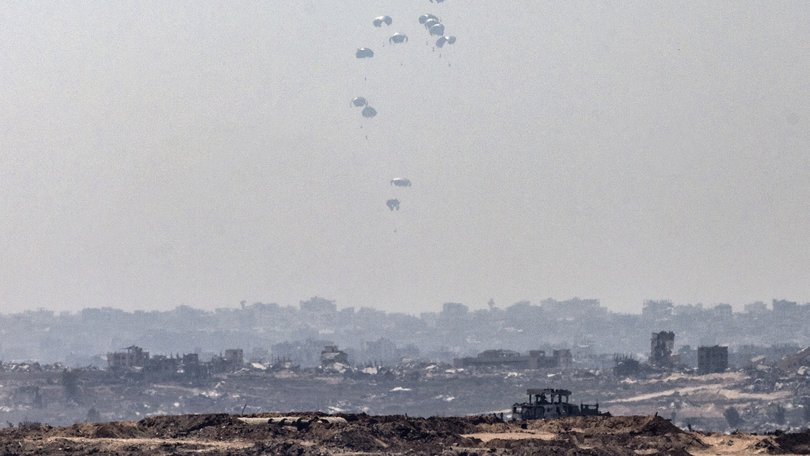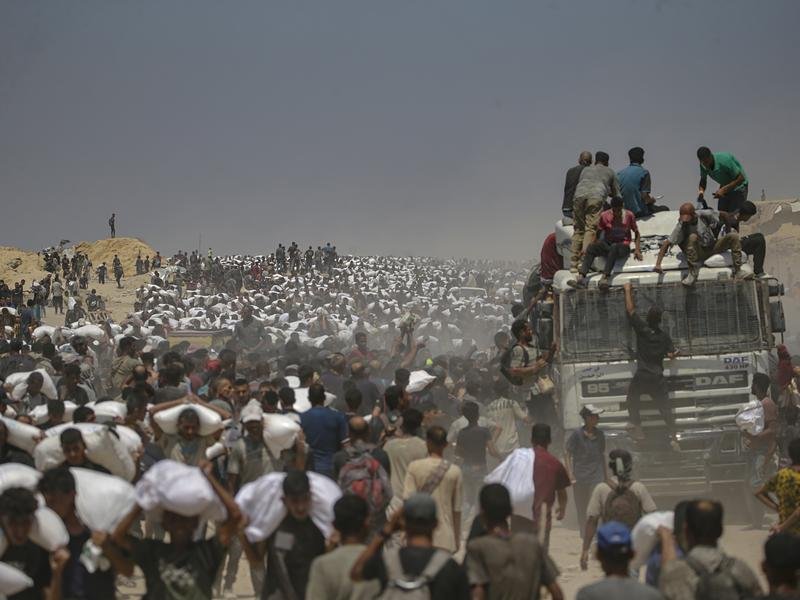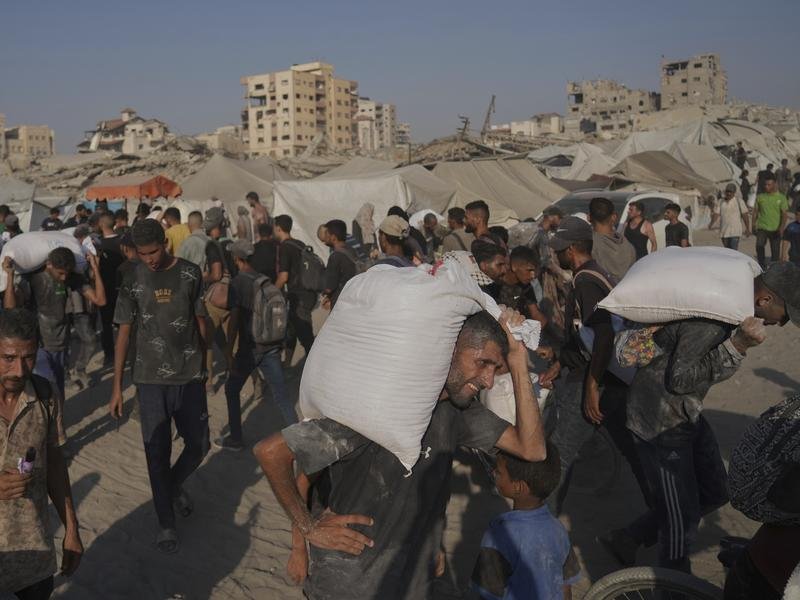Israel lets more aid trucks into Gaza, under pressure over hunger crisis
WASHINGTON POST: In a major political turnaround, Israel has begun allowing more trucks of food into Gaza and resumed supplying power to a critical water treatment plant.

Israel on Sunday began allowing more trucks of food aid into Gaza, and it resumed supplying power to a critical water treatment plant, marking a political turnaround nearly five months after Prime Minister Benjamin Netanyahu’s government started tightly controlling the flow of humanitarian aid to pressure Hamas.
It was not immediately clear how much more aid would enter Gaza daily, but UN officials said Sunday that Israel appeared willing to loosen some policies at a critical juncture when the humanitarian crisis in the territory is growing more severe.
Images and reports of the growing hunger crisis have drawn global condemnations of Israel and its restrictions on aid.
Sign up to The Nightly's newsletters.
Get the first look at the digital newspaper, curated daily stories and breaking headlines delivered to your inbox.
By continuing you agree to our Terms and Privacy Policy.Scores of trucks from Egypt and Jordan set off for Gaza early Sunday, and the Israeli military said it would facilitate the movement of UN and other aid convoys inside the besieged territory.
UN officials estimate that about 62,000 metric tons of food per month, or roughly 120 trucks per day, are needed to cover basic human needs.
Later Sunday, UN aid chief Tom Fletcher said in a statement that initial reports indicated “that over 100 truckloads were collected” from the Gaza side of the crossings with Israel.
In addition, Israel permitted multiple countries to begin airdropping food into Gaza on Sunday after the Israeli air force delivered a small initial package Saturday night.
But far more food can be transported over land, and aid professionals have been urgently calling on Israel to lift restrictions on UN aid operations, which have been heavily criticised by Israel but are considered the most efficient way to supply nearly 2 million Gazans.


For months, right-wing Israeli politicians and military hard-liners have justified the restrictions on the United Nations by arguing that its supplies often fall into the hands of Hamas militants - a claim that has been rejected by Western governments and UN officials.
Facilitating the free flow of UN aid now would represent a significant policy shift for Israel months after it sidelined the international body and backed a privately run venture called the Gaza Humanitarian Foundation (GHF).
The foundation, a US-registered nonprofit, has come under criticism for supplying inadequate amounts of food to only parts of the Gaza Strip and leaving packages at chaotic sites where mobs of desperate aid seekers often come into contact with Israeli troops.
Since May, when Israel began to restrict UN operations and rely on the GHF, more than 1,000 Palestinians have been killed by Israeli forces while seeking aid, the majority of them near the foundation’s food collection sites, according to the Office of the UN High Commissioner for Human Rights.
The GHF denies there has been any violence inside the sites themselves.
On Sunday, Gaza’s Health Ministry recorded six new deaths from malnutrition, bringing the total to 133, including 87 children.
A month ago, the number of deaths from starvation during the war stood at 65. Medics have said the ministry’s figures are probably an under count given that malnutrition is rarely listed as the primary cause of death, and that once mass hunger sets in, fatalities may rise exponentially.
In a statement Sunday, the World Health Organisation also said the numbers were “likely an underestimation due to the severe access and security constraints preventing many families from reaching health facilities.”
An Israeli military official acknowledged to reporters last week that Gaza was facing a “lack of food security” but denied there was famine.
Shira Efron, research director at the Israel Policy Forum, an American Jewish organisation that advocates for a two-state solution to the conflict, said the Israeli reversal on aid trucks was a response to several factors, including mounting criticism from important European allies, the increasingly dire situation in Gaza and a recognition that tactics to pressure Hamas have not brought about the surrender of the militant group, which leads the government in Gaza.
“There is a lot of mental gymnastics from the Israeli bureaucracy calculating the calories that get into Gaza, but those pictures coming out of Gaza are getting hard to ignore,” Ms Efron said.
“The real issue is the strategic deadlock Israel is in.”
“When Israel violated the last ceasefire in March, it vowed that with greater military pressure, with the prevention of humanitarian aid falling to Hamas and with the introduction of the GHF, Hamas will wave the white flag,” she added.
“Yet that combination of strategies has not helped bring Hamas closer to surrender. If we’re still far from a ceasefire, then Israel has to do something.”
In remarks shared by his office, Mr Netanyahu said Sunday during a visit to a military base that Israel “will need to continue allowing the entry of minimal humanitarian aid. We have done so until now.”
He maintained his criticism of the UN for “creating an excuse and a lie about the state of Israel,” but said that Israel will designate secure routes inside Gaza for its aid convoys.
According to Mr Fletcher of the United Nations and an internal UN memo seen by The Washington Post, Israel has guaranteed that there would be an uptick in aid and “tactical pauses” in fighting to allow its delivery for only one week, effective Sunday.
An Israeli military official, speaking on the condition of anonymity in line with protocol, said he was unaware that there was a week-long limitation to the aid restrictions being lifted.
The military publicly said it would carry out “tactical pauses” in three areas of Gaza along the densely populated coastline to facilitate the increased entry of aid “until further notice,” although these areas have not seen intensive military operations.
UN officials said Sunday that they were still trying to ascertain details from Israeli officials about how the new policies will be implemented, but they welcomed the news.
“There is an opportunity to use the opening for the possible scale up wherever we can and save lives, as much as operational reality will allow,” Ramiz Alakbarov, the UN humanitarian coordinator for the Palestinian territories, said in the internal memo.
Several foreign governments and political leaders also welcomed Mr Netanyahu’s decision to implement pauses in fighting and airdrops, but said the measures were not enough.
“Whilst airdrops will help to alleviate the worst of the suffering, land routes serve as the only viable and sustainable means of providing aid into Gaza,” British Foreign Secretary David Lammy said in a statement.
“These measures must be fully implemented and further barriers on aid removed. The world is watching.”
On Sunday, 21 Democratic senators issued a letter to Secretary of State Marco Rubio calling for the reinstatement of U.N.-led aid distribution in Gaza and the defunding of the GHF. The private organization’s food collection sites have “become a death trap,” Sen. Chris Van Hollen (D-Maryland) said Sunday on CBS’s “Face the Nation.”
It was a “big lie” from Israel and the Trump administration that the U.N.-led distribution program was bankrolling Hamas, Van Hollen said. “The real goal of this other effort is to use food as a weapon of war and population control.”
The spokesman for GHF did not immediately respond to a request for comment.
Apart from the announced changes to aid distribution, Israel resumed supplying electricity to a coastal desalination plant that had been shut in March after pressure from right-wing politicians.
The plant, which resumed operating Saturday, is now producing about 18,000 cubic meters of fresh water per day, Gaza’s Coastal Municipalities Water Utility said.
Residents have been facing a shortage of fresh water for drinking and cooking, and aid agencies have reported an explosion of infectious diseases because of poor sanitation.
Khaled al-Sultan, a 41-year-old who lives in a tent in Gaza City’s al-Karama neighborhood, said that around 11.30 pm local time Saturday night, pallets containing flour, sugar and canned food suddenly fell from the sky and were immediately swarmed by thousands of people.
“I had no idea who sent them; there was no announcement,” said Mr Sultan, who managed to grab four small bags of flour. “It was chaotic. People were yelling and fighting, everyone just wanted to grab as much as they could.”
Anticipation was building among residents Sunday that an influx of aid would be coming overland, Sultan said. As of midday, thousands of people had already gathered in urban centres, while Palestinian tribal elders urged citizens to not swarm truck convoys.
Social media accounts showed that many trucks that entered Sunday were immediately looted, underscoring the challenges in delivering aid to hard-to-reach areas of the enclave even if Israel lifts its controls at the border.
“People are starving, and it’s extremely difficult to maintain discipline under such conditions,” said Alaa Eldine al-Aklouk, a member of the Palestinian Tribal and Clans Council.
Still, the relaxation of aid provoked an angry response almost immediately from the political far right.
As a small group of Israelis gathered Sunday morning to protest aid trucks entering from Egypt, Netanyahu’s national security minister, the ultranationalist settler leader Itamar Ben Gvir, took to social media to accuse the prime minister of discussing and implementing the loosening of aid behind his back.
“On Saturday night, I was informed by a source in the Prime Minister’s Office that during the Sabbath, a security consultation was held without me,” Mr Ben Gvir wrote on X.
“It turns out that the ‘alternative way’ is to surrender to Hamas and its false campaigns and to increase the humanitarian aid that reaches it directly. … The only way to win the war and bring back the hostages is to completely halt the ‘humanitarian’ aid, conquer the entire Gaza Strip and encourage voluntary emigration.”
Gayil Talshir, a political scientist at Israel’s Hebrew University, said Netanyahu’s heavy restrictions on aid were becoming increasingly untenable. The weekend decision to allow in more food came only after the Israeli parliament, or Knesset, entered its summer recess, she noted.
“Netanyahu understands the international pressure is mounting, and that the situation cannot be resolved through all the obstacles he put himself into … in order to protect his coalition,” Ms Talshir said.
- - -
Cheeseman reported from Beirut, Soroka from Tel Aviv and Shamalakh from Cairo.
© 2025 , The Washington Post
